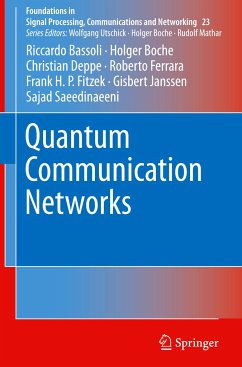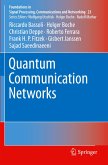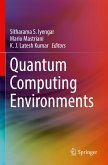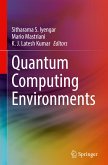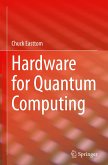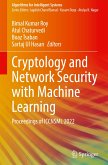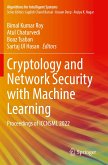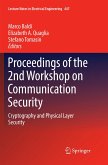- Gebundenes Buch
- Merkliste
- Auf die Merkliste
- Bewerten Bewerten
- Teilen
- Produkt teilen
- Produkterinnerung
- Produkterinnerung
This book provides a tutorial on quantum communication networks. The authors discuss current paradigm shifts in communication networks that are needed to add computing and storage to the simple transport ideas of prevailing networks. They show how these 'softwarized' solutions break new grounds to reduce latency and increase resilience. The authors discuss how even though these solutions have inherent problems due to introduced computing latency and energy consumption, the problems can be solved by hybrid classical-quantum communication networks. The book brings together quantum networking,…mehr
Andere Kunden interessierten sich auch für
![Quantum Communication Networks Quantum Communication Networks]() Riccardo BassoliQuantum Communication Networks58,99 €
Riccardo BassoliQuantum Communication Networks58,99 €![Quantum Computing Environments Quantum Computing Environments]() Quantum Computing Environments97,99 €
Quantum Computing Environments97,99 €![Quantum Computing Environments Quantum Computing Environments]() Quantum Computing Environments97,99 €
Quantum Computing Environments97,99 €![Hardware for Quantum Computing Hardware for Quantum Computing]() Chuck EasttomHardware for Quantum Computing93,99 €
Chuck EasttomHardware for Quantum Computing93,99 €![Cryptology and Network Security with Machine Learning Cryptology and Network Security with Machine Learning]() Cryptology and Network Security with Machine Learning164,99 €
Cryptology and Network Security with Machine Learning164,99 €![Cryptology and Network Security with Machine Learning Cryptology and Network Security with Machine Learning]() Cryptology and Network Security with Machine Learning164,99 €
Cryptology and Network Security with Machine Learning164,99 €![Proceedings of the 2nd Workshop on Communication Security Proceedings of the 2nd Workshop on Communication Security]() Proceedings of the 2nd Workshop on Communication Security112,99 €
Proceedings of the 2nd Workshop on Communication Security112,99 €-
-
-
This book provides a tutorial on quantum communication networks. The authors discuss current paradigm shifts in communication networks that are needed to add computing and storage to the simple transport ideas of prevailing networks. They show how these 'softwarized' solutions break new grounds to reduce latency and increase resilience. The authors discuss how even though these solutions have inherent problems due to introduced computing latency and energy consumption, the problems can be solved by hybrid classical-quantum communication networks. The book brings together quantum networking, quantum information theory, quantum computing, and quantum simulation.
Produktdetails
- Produktdetails
- Foundations in Signal Processing, Communications and Networking 23
- Verlag: Springer / Springer International Publishing / Springer, Berlin
- Artikelnr. des Verlages: 978-3-030-62937-3
- 1st edition 2021
- Seitenzahl: 248
- Erscheinungstermin: 4. Februar 2021
- Englisch
- Abmessung: 241mm x 160mm x 20mm
- Gewicht: 541g
- ISBN-13: 9783030629373
- ISBN-10: 3030629376
- Artikelnr.: 60307578
- Herstellerkennzeichnung Die Herstellerinformationen sind derzeit nicht verfügbar.
- Foundations in Signal Processing, Communications and Networking 23
- Verlag: Springer / Springer International Publishing / Springer, Berlin
- Artikelnr. des Verlages: 978-3-030-62937-3
- 1st edition 2021
- Seitenzahl: 248
- Erscheinungstermin: 4. Februar 2021
- Englisch
- Abmessung: 241mm x 160mm x 20mm
- Gewicht: 541g
- ISBN-13: 9783030629373
- ISBN-10: 3030629376
- Artikelnr.: 60307578
- Herstellerkennzeichnung Die Herstellerinformationen sind derzeit nicht verfügbar.
Riccardo Bassoli is senior researcher at Deutsche Telekom Chair of Communication Networks at Faculty of Electrical and Computer Engineering at Technische Universität Dresden (Germany). He received his B.Sc. and M.Sc. degrees in Telecommunications Engineering from University of Modena and Reggio Emilia (Italy) in 2008 and 2010 respectively. Next, he received his Ph.D. degree from 5G Innovation Centre at University of Surrey (UK), in 2016. He was also a Marie Curie ESR at Instituto de Telecomunicações (Portugal) and visiting researcher at Airbus Defence and Space (France). Between 2016 and 2019, he was postdoctoral researcher at University of Trento (Italy). He is IEEE and ComSoc member. He is also member of Glue Technologies for Space Systems Technical Panel of IEEE AESS. Holger Boche received the Dr.rer.nat. degree in pure mathematics from the Technische Universität Berlin, Berlin, Germany, in 1998, the Dipl.Ing. and Dr.Ing. degrees in electrical engineering from the Technische Universität Dresden, Dresden, Germany in 1990 and 1994, respectively, and the degree in mathematics from the Technische Universität Dresden, in 1992. From 1994 to 1997, he was involved in postgraduate studies in mathematics with the Friedrich-Schiller Universität Jena, Jena, Germany. In 1997, he joined the Heinrich-Hertz-Institut (HHI) für Nachrichtentechnik Berlin, Berlin. In 2002, he was a Full Professor of mobile communication networks with the Institute for Communications Systems, Technische Universität Berlin. In 2003, he became the Director of the Fraunhofer German-Sino Laboratory for Mobile Communications,Berlin, and the Director of HHI in 2004. He was a Visiting Professor with ETH Zurich, Zürich, Switzerland, in Winter 2004 and 2006, and KTH Stockholm, Stockholm, Sweden, in Summer 2005. Since 2010, he has been with the Institute of Theoretical Information Technology and a Full Professor with the Technische Universität München, Munich, Germany. He was elected asa member of the German Academy of Sciences Leopoldina in 2008 and the Berlin Brandenburg Academy of Sciences and Humanities in 2009. Since 2014, he has been a member and an Honorary Fellow of the TUM Institute for Advanced Study, Munich. He is a member of the IEEE Signal Processing Society SPCOM and the SPTM Technical Committee. He was a recipient of the Research Award Technische Kommunikation from the Alcatel SEL Foundation in 2003, the Innovation Award from the Vodafone Foundation in 2006, and the Gottfried Wilhelm Leibniz Prize from the German Research Foundation in 2008, and the 2007 IEEE Signal Processing Society Best Paper Award, and a corecipient of the 2006 IEEE Signal Processing Society Best Paper Award. Christian Deppe received the Dipl.-Math. degree in mathematics from the Universität Bielefeld, Bielefeld, Germany, in 1996, and the Dr.-Math. degree in mathematics from the Universität Bielefeld, Bielefeld, Germany, in 1998. He was a Research and Teaching Assistant with the Fakultät für Mathematik, Universität Bielefeld, from 1998 to 2010. From 2011 to 2013 he was project leader of the project ``Sicherheit und Robustheit des Quanten-Repeaters¿¿ of the Federal Ministry of Education and Research at Fakultät für Mathematik, Universität Bielefeld. In 2014 he was supported by a DFG project at the Institute of Theoretical Information Technology, Technische Universität München. In 2015 he had a temporary professorship at the Fakultät für Mathematik und Informatik, Friedrich-Schiller Universität Jena. He is currently project leader of the project ``Abhörsichere Kommunikation über Quanten-Repeater¿¿ of the Federal Ministry of Education and Research at Fakultät für Mathematik, Universität Bielefeld. Since 2018 he is at the Department of Communications Engineering at the Technical University of Munich. Roberto Ferrara have obtained his Msc in physics at the Niels Bohr Institute of the University of Copenhagen and his PhDin science at the Department of Mathematical Sciences of the University of Copenhagen. In his PhD dissertation "An Information-theoretic Framework for Quantum Repeaters", he studied the limitations of distilling bipartite classical key from quantum states when the two parties can only share entanglement with the aid of a third party, the quantum repeater, covering topics of entanglement measures, quantum operations and quantum information theory. Since 2019 he is at the Department of Communications Engineering at the Technical University of Munich. Frank H. P. Fitzek is a Professor and head of the "Deutsche Telekom Chair of Communication Networks" at TU Dresden coordinating the 5G Lab Germany. He is the spokesman of the DFG Cluster of Excellence CeTI. He received his diploma (Dipl.-Ing.) degree in electrical engineering from the University of Technology - Rheinisch-Westfälische Technische Hochschule (RWTH) - Aachen, Germany, in 1997 and his Ph.D. (Dr.-Ing.) in Electrical Engineering from the Technical University Berlin, Germany in 2002 and became Adjunct Professor at the University of Ferrara, Italy in the same year. In 2003 he joined Aalborg University as Associate Professor and later became Professor. He co-founded several start-up companies starting with acticom GmbH in Berlin in 1999. He has visited various research institutes including Massachusetts Institute of Technology (MIT), VTT, and Arizona State University. In 2005 he won the YRP award for the work on MIMO MDC and received the Young Elite Researcher Award of Denmark. He was selected to receive the NOKIA Champion Award several times in a row from 2007 to 2011. In 2008 he was awarded the Nokia Achievement Award for his work on cooperative networks. In 2011 he received the SAPERE AUDE research grant from the Danish government and in 2012 he received the Vodafone Innovation prize. In 2015 he was awarded the honorary degree "Doctor Honoris Causa" from Budapest University of Technology and Economics (BUTE). His current research interests are in the areas of wireless and 5G communication networks, network coding, cloud computing, compressed sensing, cross layer as well as energy efficient protocol design and cooperative networking. Gisbert Janßen has been with the Institute of Institute for Theoretical Information Technology at the Technical University Munich as a researcher from 2010 to 2019. He received a physics diploma from Berlin Technical University in 2010 and a Dr. rer. nat. degree from the Technical University Munich in 2016. Sajad Saeedinaeeni received the B.S. and M.S. degrees in Physics from Royal Holloway University of London in 2010 and Leipzig University in 2015, respectively. He wrote his Master's thesis on Quantum Hypothesis Testing at Max Planck Institute for Mathematics of Leipzig. He is currently working toward the Dr.-rer.nat degree in Physics at the Institute of Theoretical Information Technology of the Technische Universität München (TUM) under supervision of Holger Boche.
Introduction.- Fundamental Background.- Quantum Computing and Programming.- Quantum Information Theory.- Quantum Error Correction.- Quantum Communication Networks- Quantum Communication Networks: Design and Simulation.- Quantum Communication Networks: Final Considerations and Use Cases.
Introduction.- Fundamental Background.- Quantum Computing and Programming.- Quantum Information Theory.- Quantum Error Correction.- Quantum Communication Networks- Quantum Communication Networks: Design and Simulation.- Quantum Communication Networks: Final Considerations and Use Cases.

